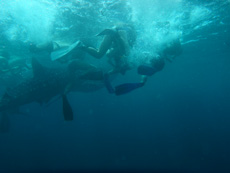Excessive human interaction with whale sharks in South Ari Atoll could eventually lead to the species leaving the area permanently, the Maldives Whale Shark Research Project (MWSRP) has warned.
“We have reports of tourists touching and even attempting to ride the sharks,” said Adam Harman from the MWSRP.
In June last year the southern tip of the Ari Atoll region, a year long whale shark aggregation site, was declared a marine protected area (MPA). But recently there has been a large increase in the number of tourists visiting the area.
“The whale sharks have attracted more and more tourists to the area. Sometimes there are 25 boats and over 100 tourists swimming around one shark,” Harman said.
Interaction guidelines were implemented to protect whale sharks in 2008. According to these guidelines, only 12-13 swimmers from one boat are allowed around a shark at any given time, and even then there is to be no contact with the animals. However these guidelines are difficult to monitor since they are self regulated.
According to MWSRP, once a shark is spotted all the boats in the area converge around the shark, ‘caging’ it in. This endangers the animal in many ways and there is a huge possibility of propeller damage.
“If this keeps up we risk losing the sharks. They will move onto other preferential habitats” warned Harman.
“Currently we are getting three sightings a day. We used to have 39 encounters in the same three day period.
“Its hard to say what could happen, but if things don’t change by this time next year, the number of sharks in this area could go down.”
The threat of losing the whale sharks is very real, Harman emphasised. Similar cases have been recorded in Mexico and South Africa, where whale sharks have been known to leave their habitats.
This is not the first incident in South Ari Atoll where marine life have left to seek other preferential habitats. South Ari Atoll Madivaru, ‘Manta point’, was once a popularsite for manta rays.
“At one time you could spot almost 50. Today however, spotting even one is considered lucky,” Harman said.

Violent clashes
The clash of ideas has led to hostile confrontations between operators and researchers. In one incident a knife was allegedly used by safari operators to threaten researchers.
Director of the Environmental Protection Agency, Ibrahim Naeem, confirmed the government had received reports of such confrontations.
“We have urged the researchers and operators to stay out of each others’ way,” he said. “We do get many complaints about people interfering with whale sharks, but since the law doesn’t say its illegal, people still do it,” he continued.
“Divers and safari operators argue that 12 swimmers per whale is not enough, while scientists say that more than 12 poses a risk to the animals. We are having talks with the people involved in the industry and are in the process of reviewing the guidelines.”
The MWSRP have been working closely with the evironment, fisheries and tourism ministries to find a solution to the problem.
Minister of Tourism Dr Ali Sawad said ” We have been working in coordination with the environment ministry, and we are looking for ways to increase awareness and work more closely with divers associations and safari operators.”
Images provided by MWSRP.
 (0)Dislikes
(0)Dislikes (0)
(0)